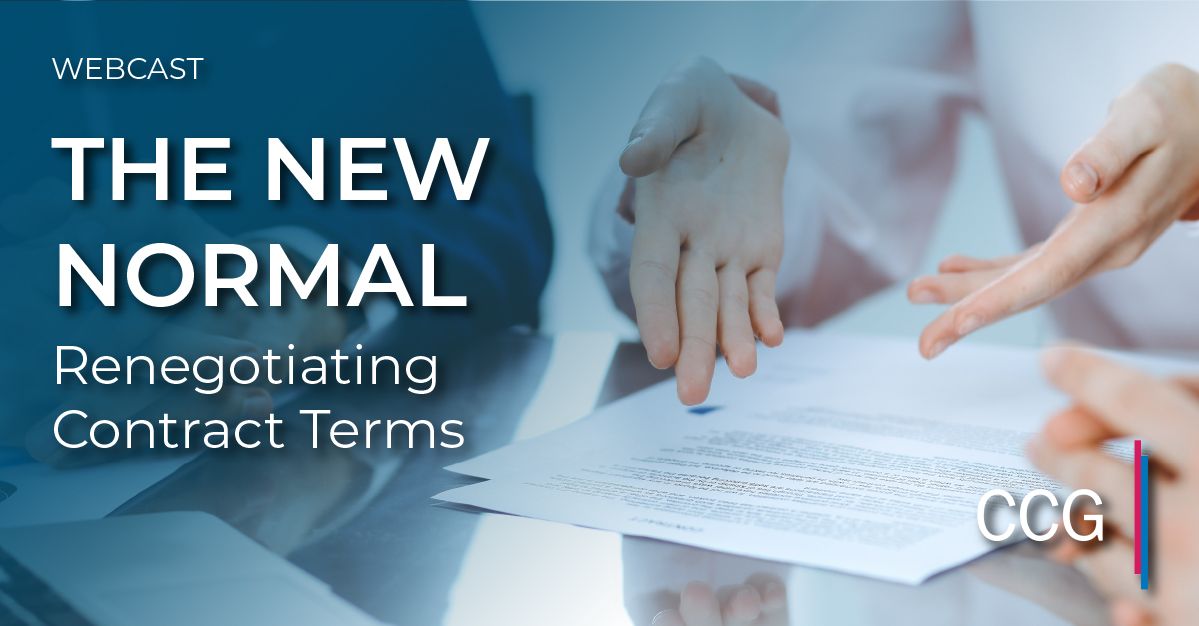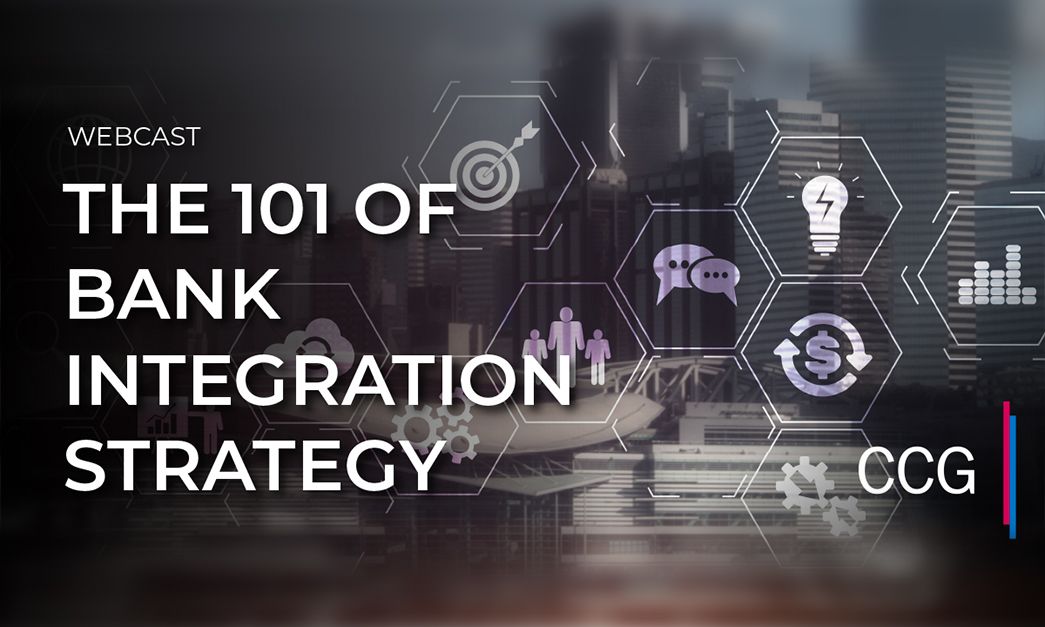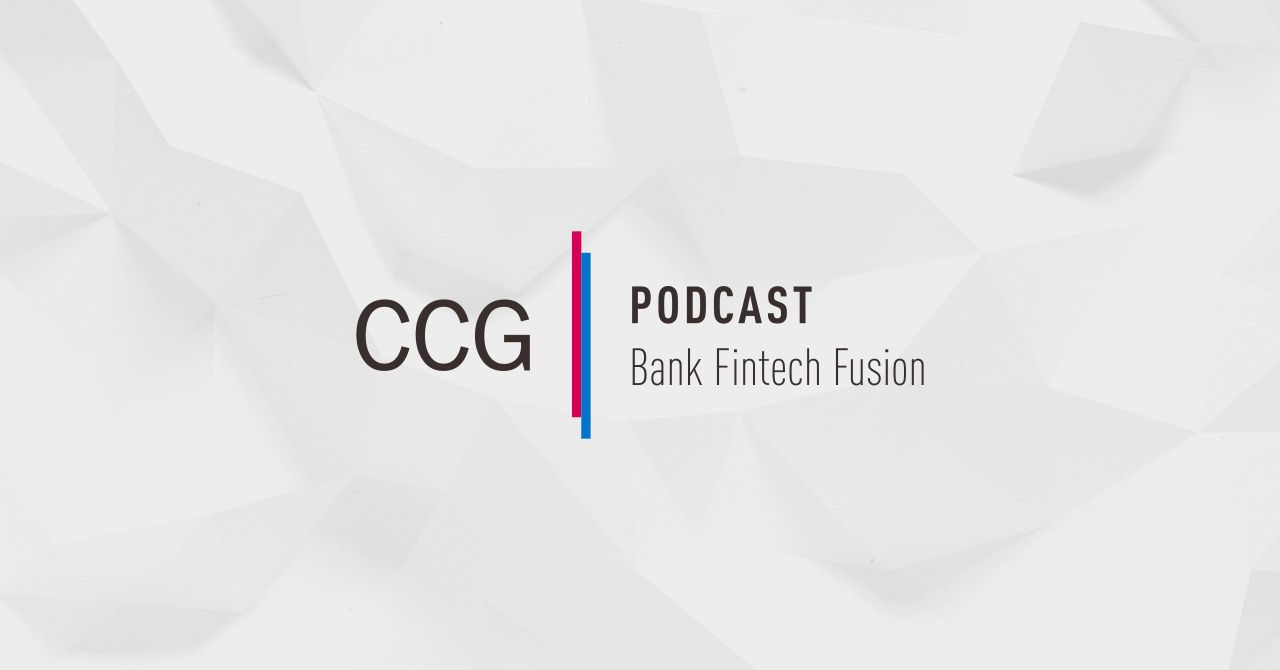The New Normal: Renegotiating Contract Terms
Available On Demand – 18 minutes
Join the CCG team for a fireside chat with Scarlett Sieber and financial services veteran Pat Valentino discussing the fundamentals of contract negotiation and how to best leverage your position to get the most from your vendor. Whether this is a new contract or you want to renegotiate an existing contract, listen in to this 15 min chat and leave feeling prepared to negotiate favorable terms and pricing.
Subscribe to CCG Insights.
[restrict]
Scarlett Sieber Welcome back to CCG’s Webcast series, we are coming to you on The New Normal webcast series and I am very, very excited to be introducing yet another colleague from the CCG Catalyst team. I have the incredible Pat Valentino, who is the Chief Relationship Officer here at CCG Catalyst. As always, I am your host, Scarlett Sieber, Chief Strategy and Innovation Officer here at CCG Catalyst. Pat, thank you so much for joining us today. We are excited to have you as part of the series.
Pat Valentino Hey Scarlett. How are you?
Scarlett Sieber Doing well, doing well. Looking forward to getting into this great topic. This week, on The New Normal series, we’re going to be looking at renegotiating contract terms. You’ve probably seen a lot coming out of the CCG Catalyst team on our different platforms around this concept. It is something that we are true experts in, especially Pat Valentino and others on our team. So, we wanted to go a little bit further and explore a little bit more of what that looks like. So before we get started, a few housekeeping rules, as always, you will see a variety of buttons at the bottom of your screen, the middle button with the picture of Pat and I’s face, that’s where our bios are. You can click on that, see our backgrounds, our bios. You’ll hear a lot about Pat’s background looking at this from a variety of angles and really why she’s a true expert, especially with things that relates to contract negotiation. You can contact her directly on LinkedIn through there as well as email her directly. You see all of my contact info. To the right of that button, you see the CCG logo, that is your go to place for all resources and things CCG. You have our most recent articles published on a variety of publications as well as on our blog and links to future podcasts and webcasts as well. So please utilize that at your disposal. To the left you have that Q and A button. So throughout the variety of this conversation you will have the ability to go ahead and ask questions to myself or Pat. We will try our best to respond in chat, and in worst case, we will reach out to you right afterwards answering those questions for you. And with that, let’s get going, Pat. You know one of the things that we always do when we try to differentiate with this series is making this short, concise, to the point, giving you direct things that you need in around 15 minutes or less and I’m looking forward to getting started with you. So, on that note, why don’t we just dive right in, Pat. When we’re thinking about renegotiating contract terms, kind of high-level question, are all contracts really open to negotiate these days with this new world we’re living in?
Pat Valentino Well, I think Scarlett you know we tried back on the last big pandemic situation, the recession, with people trying to come in and reduce their pricing immediately. Thinking pricing is the issue is not necessarily a contract renegotiation you’re looking for, but maybe the ability to go in and change your pricing dynamic. So those things are open. I wouldn’t call it a full-on contract negotiation, but they’re give and takes when you go through that kind thing. But contract in general, do have the ability to be renegotiated however it’s kind of a give and take.
Scarlett Sieber There are a lot of different vendors out there, are there different types of vendors that have more of a willingness or less willingness than others to negotiate during this time or more broadly?
Pat Valentino Well, I think it depends on where you are in your contract, whether or not you’ve got additional leverage on your side of the contract. Yes, each vendor is a little different and there are different needs for the vendor as well as different needs for the organization. So taking a look at all of those levers that are within a contract and why you’re looking to renegotiate. What’s your goal when looking at the contract?
Scarlett Sieber So you mentioned the idea that the last pandemic that happened, definitely people were more focused on pricing than anything else. As a bank or as a credit union what types of things really can I and should I be focusing on when I’m negotiating? And why would I be focusing on those things?
Pat Valentino And that’s a great question, because what happens is people wait to the one point and time they have to negotiate to try and put everything in that basket at the same time and really don’t realize all of the pieces and levers that are important to them or to their contract. Things like term, termination penalties, what happens if I leave? What if I get acquired? What if someone else gets acquired? There’s risk in liability, and what’s my coverage there? What’s my ability in the service I’m getting right now? How are my products getting installed? Do I have anything in my contract that helps me besides just a straight service level? It really is trying to build a contract that meets the needs of the organization and it’s not just about price. I think that’s where sometimes people lose focus because they make price a priority versus stepping back and understanding the relationship that you’re going to have for the term the few years 5, 7, 3 with the client and the vendor. There are so many different points and priorities for each individual organization when they go in to renegotiate.
Scarlett Sieber So not everyone can be a master negotiator like yourself. I know you and I have had many conversations about the joy that you get and being involved in that negotiation and doing that. Some people find it very intimidating. Some people don’t feel like they have the right expertise to do that. If I say, hey, now’s the time for me to go in and do some negotiation, when and how would I start doing that?
Pat Valentino Well, I think you need to step back and understand what’s your goal and what’s you’re leverage. So, if you are just into a five year contract in year one, obviously, either something went wrong when you did that renewal that you’re looking to renegotiate or something dramatically changed. So, it really is looking at what is your goal in a renegotiation. So today we find there are various types of contracts where someone has three years left on, say a five or a seven year term. And really their dynamics have changed since they signed that contract. Either they become more acquisitive, they become ready to set themselves up for an acquisition, they’ve decided there are product sets they need that they didn’t plan on before, their business model has changed. So stepping back and taking a look at what exactly they’re trying to gain from that negotiation is key. The other piece is making sure you realize on the other side there’s always a give and take. So, you’re not going to get all these changes for nothing. The vendor needs something back. Right? They either need you to take more term, take more product. Maybe if you’re looking for pricing relief early on now, it gets added to the back end of your contract, think of mortgage forbearance where you add everything to the back end. There are a lot of ways to set things up, but it depends on where you are and what your goal is. So when do you start? It doesn’t hurt to start ongoing with your contract from the time you negotiate it, sign it, don’t just put it in the filing cabinet and ignore it because that’s what you’ll hear a lot. It’s just a piece of paper filed away. It is how you manage your relationship with your vendor. There are things in there with regard to service levels and operations and how the service is supposed to be delivered and those kinds of things that are important to know about. As you get more into your contract, those things become more important, especially as you look to buy new product or change out what product you have. So when to start? If the term is up relatively soon, I’d say you started too late. At least two years out, start looking at what you’re going to do.
Scarlett Sieber Yeah, I think that’s really good advice and makes a lot of sense because also you don’t want to be stuck in a position where you’re now being reactive, where that’s about to go and we need to make a decision because everything is based off of it. If you’re kind of building it into your larger strategy and thinking about what do we want moving forward, I know you and I have seen and talked about individuals that we’re aware of that go in and buy a suite of products from one of these vendors and realizing that they were actually going to go into a new line of business. Now, this suite of product doesn’t necessarily overlap with that line of business they want to go in. So it’s really being strategic as you’re thinking about the future of what you want to do and making sure that the services and products and vendors you’re choosing are accommodating of those things and growing with you as you grow.
Pat Valentino The other thing is, if you’re going to renegotiate and you’re going to take a position that’s very important to you, be ready if the vendor doesn’t agree to what your next direction is going to be. So if you truly are upset with service or don’t like the price or you really need certain things and your vendor bundle the price for a simplified contract and your vendor is saying, you know what, I can’t do that for you. You need to seriously consider what your alternative is and give yourself time for that. So if you don’t get what’s really important, are you willing to leave? Are you willing to move to a different position? What is your fallback if the vendor says no, because they are not always going to say yes. So you have to be fluid in that. So just want to make sure I added that in there.
Scarlett Sieber I think it’s a great point. So there are a lot of aspects and things to consider when you’re thinking about the complexities of a contract. What would you say are some of the key, maybe two or three really most important points to consider when you’re thinking about these negotiations?
Pat Valentino You know, I have found through the years I’ve been doing this, it really needs to be financial institutions specific. Right. People will always say price or they’ll say term or discounts, but it really becomes what is the most important thing to you? I’m not saying that necessarily price isn’t important, but getting the lowest price for something and then sacrificing the ability to have some termination for convenience or some lesser cost, if you have to move, may have been short sighted. I got a low price, but it’s costing me a lot if I want to become a merger partner with somebody. So, its really where are you going strategically? What does the next couple years look like? And what is important to you so that you’re not just going out talking to all your peers and trying to find out what all the good things they got and add up these good things mean a bundle and go to your friend and say, I want all of this. But because that really doesn’t meet in some cases when you do that, you don’t get anything you need. And you get all these things you don’t want. And so, it’s really understanding what’s important to you. Is it like a limitation of liability? Is it service levels or service commitments that have more than just penalties that actually allow you to fast fail a product, allow you to leave a product if it doesn’t work the way you need to without paying penalties. It allows you to experiment more where in the past you just had to sign up and ride it out for the term. Those things are all new components that are coming into play.
Scarlett Sieber So that there’s a lot to cover and consider there if you’re an executive at a bank or credit union. What role or kind of value do you see external partners? You know, like a CCG catalyst or someone along that lines helping with this. Because, you know, why would they need help with negotiation? Depending on who you are and where you are within that bank, you negotiate loans with clients all the time. So you do a lot of negotiation. Why? Why would you want an outside party to potentially help in an environment like this?
Pat Valentino So you talked in the beginning, introduced me as this master negotiator, the ability to get all this stuff done. I will never negotiate for myself because I get too emotional to the point of what I’m trying to negotiate for. So when you see people buy houses, when you see people buy cars, when you do anything that’s big, that’s complex, that you have real attachment to the end result. It creates something – you can’t help it, you can’t help being emotionally involved. So having a third party allows both the client, the banker, the financial institution and the vendor to kind of keep a relationship after the fact. Nobody kind of gets upset with anybody. The other side, because there’s a middle person that’s kind of delivering these messages and helping bring these parties together without the emotional attachment. That’s one of the key pieces. Also, because we do this or third parties do this so much, you see a broad span of things across a huge market and industry. And so you’re able to bring more kind of information. And the industry perspective. What’s shifting? Where, you know, where is the market going? We’re seeing a lot of attention to contracts these days. And there’s you know, there’s talk of simplifying contracts, making them easier. And other regulators get involved a little bit on what should be in your contract. But I think as we go forward, we’re going to see a big shift in this area to allow that product to be bundled, put together a flat rate. Not all these incremental prices. And if you see that shift individually as the banker, you’re not always going to know that. You may find out from some of your peers, but you don’t see it in the broad scale that we do. So it’s about the emotion, the information and the ability after the fact to keep the parties moving forward in it in a very positive way.
Scarlett Sieber No, I love that and all of my experiences with you as a master negotiator, I guess really weren’t on the personal side and you were able to kind of see both, which was fantastic. And I think one of the things that I’ve always loved about your background as well as you really have been able to look at it from that holistic perspective, because you’ve been the one on the vendor side who has been leading this and doing that. And then you’ve been on the bank exec side leading this and doing this and you’ve even been on the regulator side. And one of the things that’s kind of cool about our team is that they’re comprised of people have come from all of these big vendors. So, they really have that in depth perspective. But then can also recognize opportunities where, you know, the competitors and everyone else are. So I think that’s fabulous. Very, very helpful Pat. I appreciate that. Anything else? Any other last minute tidbits that you want to share with the audience?
Pat Valentino Don’t be afraid of your contract. I know it’s a huge document. It looks like a lot of legalese. I am not a lawyer. Get to the parts that are very pertinent to you and understand what value it has for you. It’s not just a piece of paper that you file away. It helps you manage your relationship with your vendors.
Scarlett Sieber Perfect. Well, you heard it here from the powerhouse that is Valentino. Pat, thank you so much. I’m so happy to get you on this. You are a hard woman to lock down for these types of things and I’m so excited that you’re able to share some time with us. For all of you that are joining, thank you so much for taking the time. We hope this short segment was helpful for you. Obviously, there is a lot more that needs to be discussed here. We do have a few questions, but I think we will reach out to those people afterwards because we’re running out of time. So if you have any other further questions, if you have other thoughts and things you want us to cover as it relates to contracts, let us know we are here is a value resource for you. The real importance here is for you to understand the current components of your agreement, prioritize what is important as the outcome for you and to identify your leverage. We can certainly help you do that. We look forward to seeing you on future episodes of this webcast. And if there is anything else, always feel free to reach out. Until then, stay safe and we look forward to seeing you next time.
[/restrict]
Is It Finally Time for Open Banking’s Debut in America?
Over the COVID Horizon, Mobile Banking Demands Strategic Clarity
Chief Strategy & Innovation Officer Scarlett Sieber is one of the world’s premier voices in financial services. She is among the industry’s most sought-after speakers as a thought leader and innovator with expertise in driving organizational change at both startups and enterprises across the financial services and fintech ecosystem. Scarlett has been invited to speak at over 100 prestigious financial services and technology conferences globally, including Money20/20, Finovate, South Summit, and NASA’s Cross Industry Innovation Summit.
Scarlett’s experience includes founding her own startup as well as working at banks such as BBVA, USAA, and Opus Bank. She is a leading fintech influencer, included on lists such as Top 100 Women in Fintech 2019 and Top 10 Fintech Influencers in the U.S. Scarlett also has deep experience in digital strategy and innovation implementation, making her a key asset to building cutting-edge programs for our clients.

Pat has truly done it all in financial services, a banker, an examiner and successful executive in a Fortune 500 company.








